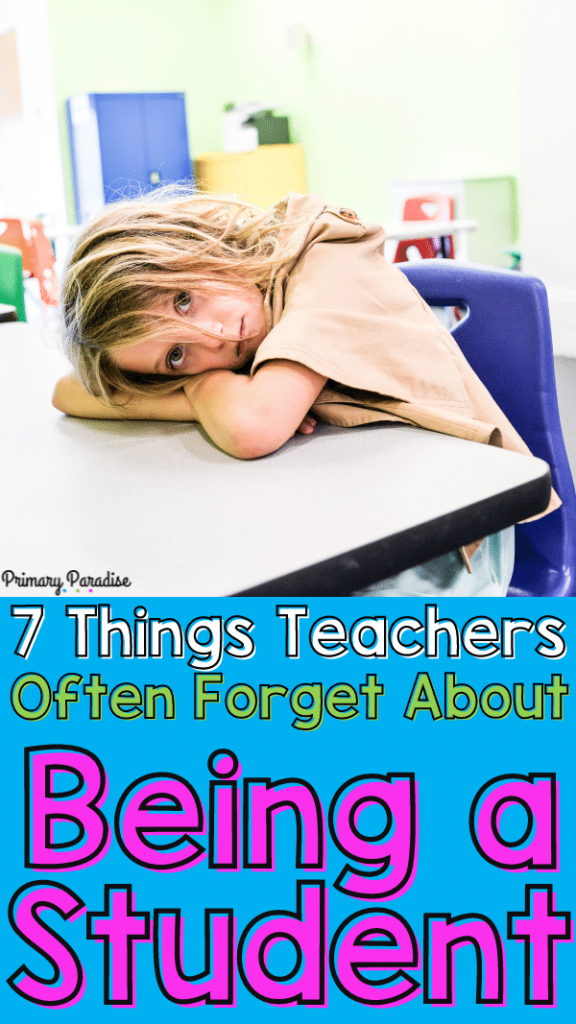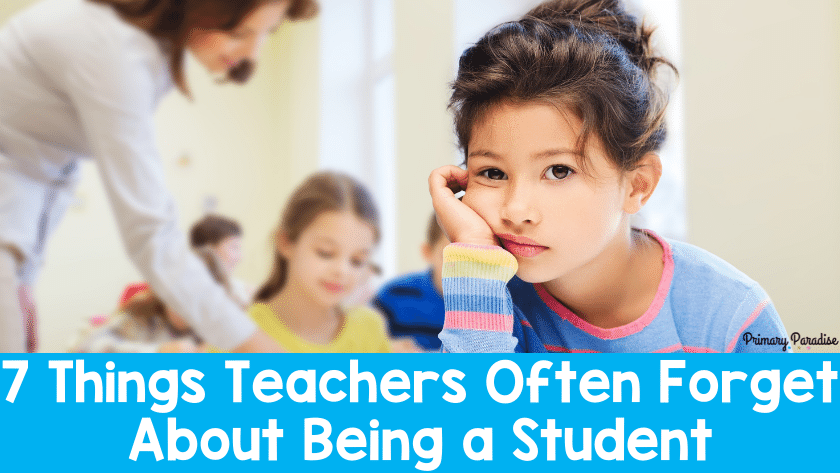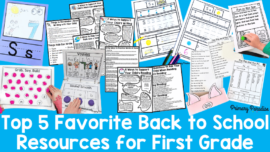Being a teacher is hard, but so is being a student. As teachers, we often become so focused on the outcomes we’re expected to produce that we forget many things about how hard it can be to be a student. Here are 7 things we often forget about being a student.
They’re trying their best.
One of my favorite quotes is that everyone is trying their best. Even if their best isn’t that great, it’s their best in that moment. This is true for our students as well. This is also something that I took way to long to realize as a teacher. When you have those kids who are struggling, they truly are trying their best. If they are having behavior issues, they are coping the best they can. Sometimes their best might be hiding under the table because they don’t know how to express themselves. Sometimes their best might be screaming at you. Is it pretty? No. But it just goes to show you that they need to be taught coping skills.
If a student is struggling to count by 10’s, you try different strategies until you figure out what makes it click. It’s the same for behaviors. I’m not saying that it’s not hard and frustrating because it is. But, trying to remember that they’re trying their best with the tools they have helps us to remember that it’s our job to help them find more tools instead of just blaming them for not trying.
This is like, really, really hard.
Learning new things is hard. Just think about how your brain hurts and you need a nap after a professional development day. Our students are basically at a PD training day every single day. On top of that, they’re 5,6,7 or 8 years old and they didn’t choose to be there. Their brains aren’t fully developed, and they often don’t have the background knowledge needed for certain skills.
They’re children, not adults.
Adults often treat children like little adults. In fact, sometimes we expect more of them than we do adults. After all, we don’t expect adults to sit perfectly still in the exact way we tell them to sit for 30 minutes at a time. It’s important to remember that our students are children. That means that their brains aren’t fully developed, they are still learning how to make good choices (aren’t we all), they don’t always know how to express themselves, and they often need breaks.
By remembering that our students are children, it helps us pay attention to how long we’re expecting them to focus on a task, how often they need breaks, and being willing to help them work through conflict and other issues together. It’s also a great reminder that we need to teach them and guide them, not punish them and shame them. They truly don’t know better a lot of the time, but we can take the time to build a relationship with them and then help them learn.
They have a life outside of school.
Just like you have a life outside of teaching, your students have a life outside of school as well. It’s easy to feel frustrated when a student doesn’t bring in their homework or they forget a form, but it’s important to remember that school isn’t their life. They go home to do sports, activities, play with friends, and spend time with family. (This is a big reason why I’m not a fan of homework.) Kids are still people once they leave the school building, and we need to respect that they have other interests, responsibilities, and priorities outside of school.
I’m not saying school isn’t an important part of students’ lives. Of course it is. But, it’s only one part.
No, you are not the only place they’re receiving love and care.
When I first started teaching, a very popular quote went something like “Remember, you might be the only consistent and loving person in your student’s life.” I think the point was to emphasize how important teaching is. And, yes. Teaching is important. However, this statement is so flawed, and reeks of white saviorism. Even if our students have a difficult home life, even if their parents or guardians are struggling, it’s wrong to assume they aren’t loving and caring for them. Parents and guardians are doing their best.
Should we care for our students? Of course. Do we need to try our best to connect with them? Absolutely. But, it is unfair to assume that we are the only people who care about them.
They don’t feel heard.
One theme that I’ve noticed often from students in all of the school in which I’ve taught is that students don’t typically feel heard. Voice and choice are support important to fostering independence, giving students a sense of control and belonging, and developing confident learners. I do think many teachers truly try to give students some choice, but it’s often surface level.
I know that I have been guilty (and still am at times) of this as well. We need to give students a chance to make their mark on our classrooms, give them say in their learning, and also listen to them when they are sharing problems and issues they’re having. Instead of minimizing their complaints and struggles, we need to listen without judgement. This isn’t always easy, but it is so important.
They have a lot to teach you.
Lastly, as teachers we often forget that our students have a lot to teach us. I mean this in two senses. First, the way we respond to students teaches us a lot about ourselves. We have to learn to be calm, patient, kind, and all kinds of other characteristics.
But, I also mean it in a more literal sense. Your students have knowledge and life experiences you don’t have. They literally can teach you about topics that you don’t know about. And, if you create the right kind of environment, they might challenge you and push you to expand and change your thinking. Just because our students are younger than us doesn’t mean that they don’t sometimes know more than us.
In the past few years, my students have taught me about Pokémon, Minecraft, dinosaurs, outer space, plants, animals, and so much more. They often have such profound and interesting ways of looking at the world, if we’re only willing to take the time to listen to them.
Understanding Students
The bottom line, trying to understand our students is such a vital part of our job as teachers. If we don’t it makes it really difficult to build relationship, manage our classroom, and create meaningful learning experiences.
Keep reading and learning:
- Why I Love Having a Proud Board in My Classroom
- 6 Reasons Why Student Jobs are Important
- 10 Things Teachers Can Do on Friday for an Easier Monday




